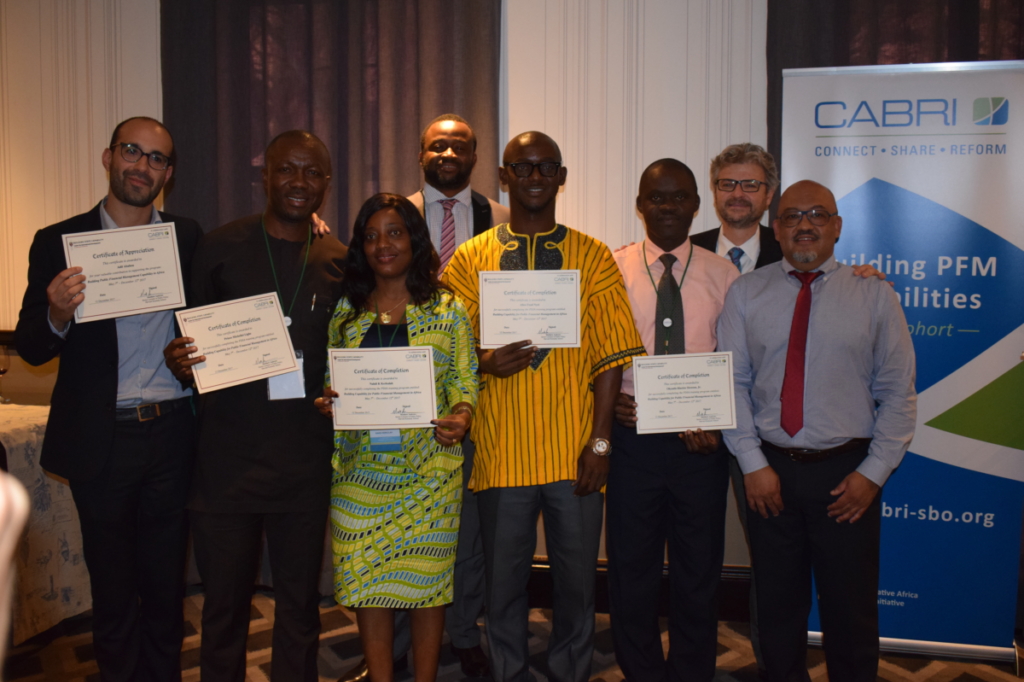This blog shares the reflections by a CABRI coach who worked with a dedicated team of Liberian officials in 2017 on the Building PFM Capabilities programme tackling the problem of high off-budget expenditures.
CABRI’s Building PFM Capabilities programme (BPFMC), designed in collaboration with the Building State Capability (BSC) program, is an eight-month-long engagement with country teams of officials that tackle locally-nominated PFM problems using the Problem Driven Iterative Adaptation (PDIA) approach with the support of a dedicated CABRI coach. While the Liberian team members described their experience through a blog, a video and a case study (Practice Notes), this blog aims to share my perspective as a coach working with the team between May and December 2017.
The team engagement started against the backdrop of huge external investments in PFM reforms in Liberia that have had mixed results. According to the OECD Development Assistance Committee, Liberia, a country of less than 5 million inhabitants, received in 2007 US$566 million in official development assistance to support its PFM, the largest yearly disbursement amount in Africa between 2002 and 2016.
The amount of US$566 million paid for a continuous stream of consultants and bought many ‘best practices’ such as:
- Medium-term expenditure framework (MTEF) that is described as being “dormant since 2014/15” (source: PEFA).
- A treasury single account (TSA) that was given a 2/10 score (source: World Bank).
- An integrated financial management information system (IFMIS) which “requires both strong human resource capacity and connectivity, both of which fall short of requirements” (source: PEFA).
The team that I coached started in April 2017 by identifying a real problem that they felt had deeply compromised budget credibility: off-budget spending is over 15% of the approved budget, while in-year budgetary transfers have been increasing. The first step was not to attempt the implementation of a ‘best practice’ solution, as is often the case.

Beyond the team’s achievements that are described in the blog and Practice Notes, I would like to share my views on some of the team’s learning and factors of success.
The team’s gradual efforts to enhance coordination within the Ministry of Finance and Development Planning (MFDP) has been a major achievement. It was hard for me to believe how seldom departments located in the same ministry coordinated and aligned their efforts. Having members on the team from different departments improved information sharing between the fiscal affairs and budget departments and brought early benefits. While this may seem to be an easy and non-technical achievement, it was a “quick win” that strengthened inter-departmental co-ordination. More specifically, it improved the communication between the budget analysts for spending entities and the database specialists which enhanced the submission time and quality of spending plans.
The team’s sense of shared purpose was key for collaboration to happen. Early in the programme, team members agreed that the PDIA approach to tackling their problem would require extra work and additional hours at the office, and that there would be no financial incentive or other form of performance reward, other than making progress in solving a problem that had evaded many previous reform efforts. They would also need their colleagues in other departments and ministries to willingly collaborate with them – they would need their acceptance. To achieve this the team arranged three workshops with spending entities. These were challenging in that the team knew that their legitimacy and the approach would be criticised. However, the feedback that they received made them aware that the MFDP was also part of the problem. A survey of spending entities was a way for the team to identify what the MFDP could do to improve their reporting procedures and showed their decisiveness in solving the problem. Furthermore, the team made a point of recognizing and valuing the individual contribution to the work achieved. That was particularly instrumental with respect to the establishment of the Liquidity Management Committee (LMC) that requires commitment by multiple departments in the MFDP. As a member of the LMC indicated: “most importantly, the information is being used for decision-making, which is a great boost to encourage us to do more”. The real and urgent nature of the problem was a crucial asset to bringing people together towards a shared goal.
A salient learning for the team was the process to gain authority in the MFDP. Authorization was necessary given the vested interests in keeping the status quo - discretionary powers of spending entities as well as agents in the MFDP. The team learned from its first failed attempt to obtain an audience with the Minister. They needed to do more and build their credibility through quick wins, stakeholder engagement and regular updates to their direct supervisors and authoriser. The authorization granted by the Minister in July 2017 led to a paradigm change for the team that “started seeing [them]selves as reformers working to deliver on a challenge”. I was personally surprised that the team, composed of senior officials who have been in office for years, had so little experience in gaining authorization in their own Ministry. As a team member recalled: “as locals, we worked harder to earn the confidence of our bosses and peers, unlike foreign experts who come in with external legitimacy”. This should not be the norm.
The team’s work led to a significant improvement in the submission of spending plans as well as to the establishment of a liquidity management committee that has an active decision-making role. There is more to be done for the team to achieve its goal to limit off-budget spending to 5% of the approved budget, in particular curbing political interference during budget execution. I wish them the best of luck for their next steps.
For further information, read the Liberia Practice Notes.